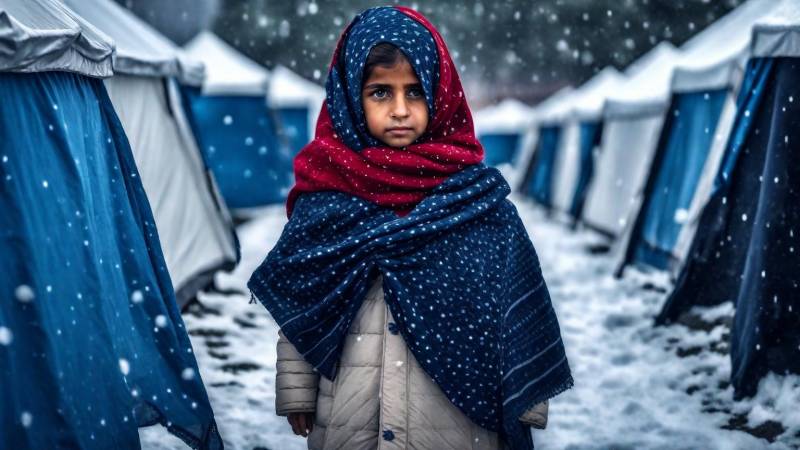
Thousands of Afghan refugees, who were forced to wrap up decades of their lives in Pakistan, leave the safety of their shelters and migrate back to Afghanistan on a moment's notice, are now staring at the prospect of facing a long, bone-chillingly cold winter. In some cases, families must brave the elements exposed to the night sky with unsatisfactory and non-existent health facilities and other related difficulties.
Families forcibly repatriated across the Durand Line say they have nowhere to go and are left with no choice but to live in the allotted camps. Unlike their warm and protected homes in Pakistan, their flimsy tents do little to keep the biting cold out.
A man struggling to care for his family, particularly his small kids in the camps, shared with his relative in Pakistan: “When we came here, the weather was normal. But with each passing day, the cold intensifies, creating hardships”.
The man, whose family did not have a Proof of Registration (PoR) Card like other registered migrants, was forced to return to Afghanistan when Islamabad's deadline for undocumented migrants expired on November 1. While crossing back into Afghanistan, he could only carry essentials, as warm clothes for the winter were too heavy for the long journey. In part, he was unsure how long this "repatriation" would last.
“We sent our relatives [back to Afghanistan] in pain," expressed the relative of an Afghan family while speaking to [The Friday Times]. He refused to share his name for fear of being targeted in the ongoing dragnet. "It is even more painful to know that they have no proper arrangements to keep their children warm in the makeshift shelters.”
“How can one pack up their belongings and carry all necessary items and make arrangements for their families according to the weather in such a short span of time,” he expressed, pointing to how the government gave them less than a month to leave.
He added that in conversations with their relatives who had made it across into Afghanistan, they described the situation as harsh for their families to survive in.
“Luckily, I have all the registrations, but my uncle and cousins have to move with families after spending a long period in Islamabad and other cities," he lamented.
Expressing apprehensions about the harsh weather in the coming weeks, the Interim Afghan Taliban's Commerce Minister Nooruddin Azizi told the media [in Kabul] that those returning from Pakistan are likely to face many problems due to the onset of winter.
Pakistan has vowed to deport all undocumented foreign nationals, including Afghan citizens, from its territory. An estimated 300,000 already left for the neighbouring nation. Islamabad's deadline for voluntary repatriation ended on November 1.
According to the government, around 4.4 million Afghans live in Pakistan. Of these, at least 1.7 million do not hold valid travel or refugee documents.
This figure, however, could be significantly larger as people living in mountainous regions of the border are accustomed to frequenting the other side where they have lands and family, often without holding travel papers from either state.
Another 1.3 million are registered as refugees with the government, holding Proof of Registration cards.
An additional 850,000 have received Afghan Citizen Cards (ACC) from the Pakistani authorities, affording them certain protections. However, not all holders of ACC have been granted PoRs.
United Nations High Commissioner for Refugees (UNHCR) spokesperson has shared that 1.3 million Afghan refugees with PoR cards, 840,000 Afghan Citizens cardholders (ACC), and some 600,000 came to Pakistan since August 2021. According to the government, he said 600,000 to 700,000 other undocumented Afghans came to Pakistan before 2021.
Carholders look over shoulders
Muhammad Bashir is an Afghan merchant based in Peshawar who deals in honey. Asked to describe the recent situation where Islamabad had asked undocumented migrants to leave, Bashir said he has seen several members of his family and friends leave the country over the past six weeks under tough circumstances.
“Many of them were just surviving in Pakistan, but the sudden directive to leave turned their lives upside down,” he said.
Bashir said that since the government's announcement to send illegal migrants and aliens back, even those holding registration cards were living in a constant state of uncertainty.
Thousands of Afghans like Bashir, who have the PoR cards, have been rethinking their future in Pakistan. They are concerned over the loss of their settled lives, businesses and assets, which they spent years building in the wake of reports that the government is limiting the money that returning Afghan refugees can carry or any other restrictive policy that the government may introduce in the future.
Caretaker Interior Minister Sarfraz Bugti has already shared that Pakistan had previously taken a very soft stance toward foreigners living with or without documents. But now, he said, a ‘hard stance’ must be adopted toward illegal foreigners in the country.
Shahid Hussain of the Sarhad Chamber of Commerce and Industry (SCCI), a forum comprising business people who trade across the Durand Line, told The Friday Times that the government needs to introduce a mechanism for people to repatriate their belongings and assets.
"They are human beings. Both countries should evolve a proper strategy to deal with this matter," he said, adding that repatriating hundreds of thousands of migrants within a month was a massive decision.
On the impact this policy will have on trade between the two countries, he said that the matter needs to be resolved in the future, adding that immediate concerns pertained to the human tragedy.

